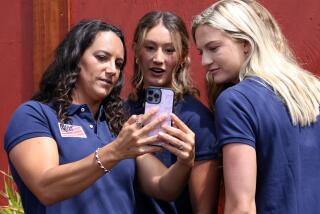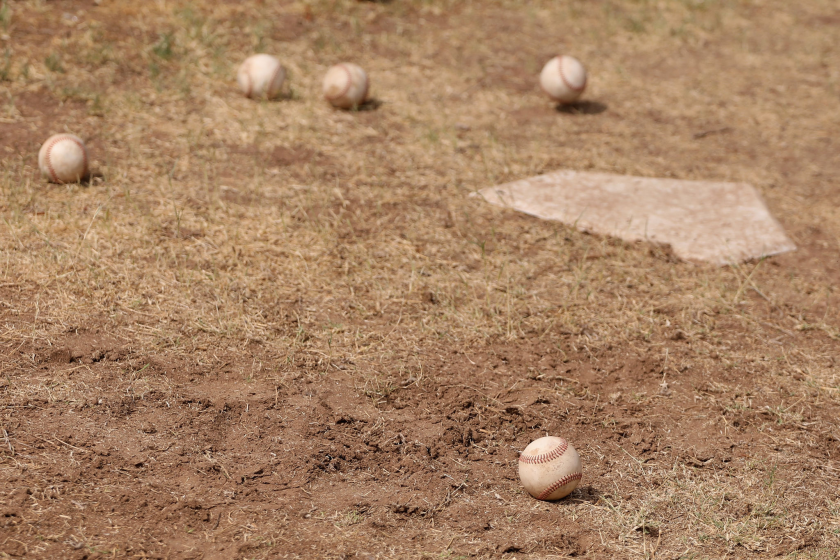Sport of Kings Back in Land of Mullahs
- Share via
TEHRAN — It has been called the king of sports and the sport of kings, but there was nothing regal about the rundown stadium outside Tehran where one of the first women’s polo matches in many generations was held.
The spectators’ stand looked worse for wear after years of neglect, and its concrete base had disintegrated to reveal the underlying structure of intertwined rusted metal bars.
But against the decay and the gray sky, the mood was jovial as about 100 spectators and journalists gathered recently to watch an equestrian sport that is believed to have originated in Iran more than 2,500 years ago.
Polo, or chogun, as it is called in Persian, was once a courtly game that prepared riders and horses for military battles but was also played for leisure by male and female members of the royal court.
Although the sport traveled from Iran to surrounding countries and found many fans, it was on the decline in Iran by the mid-20th century.
Aficionados of the sport, long associated with the monarchy, pretty much put away their mallets after the 1979 revolution overthrew the shah and ushered in an Islamic-populist ideology. Not only was it politically inappropriate, there was little time in war-ravaged Iran to think about funding a relatively expensive and generally elitist sport.
Now the Polo Federation of Iran, founded two years ago, is trying to bring the game back to life here.
“This is the only sport of which we know that it is 100% Iranian. We have to revive it,” said the federation’s director and primary financial sponsor, Hamzeh Ilkhanizadeh. An industrialist and a Kurd from western Iran, he grew up with horses and says polo was once as common a game in Iran as soccer is today.
Although polo is traditionally a mixed game, in today’s Islamic Republic female players are not allowed to compete with men. The females wear Islamic head scarves underneath their helmets and knee-length cotton coats.
In a bid to make up for the shabbiness of the stadium where the inaugural game was played, red Persian carpets were spread over the wide, descending steps of the spectators’ stand. Fans sat on velvet-covered foldout chairs and helped themselves to hot tea and sweets from golden-legged tables.
The stadium was a riding arena before the revolution, and was named after Queen Farah, wife of the last shah. Today it is called Martyrs’ Stadium, and verses of the Koran instead of the national anthem were sung before the game.
As the game started, six female riders -- three a side -- trotted onto the field with their polo-trained horses. The sports commentator weaved in lessons about the history and rules of the game, aware that many in the audience had never seen a polo game before.
They witnessed a visually beautiful game of finesse and strength, with riders who had to firmly control their horses with just one hand, leaving the other free to hold the mallet. The speed of the galloping horses and the delicacy of the players’ maneuvers thrilled the crowd.
When one team, consisting of two Iranians and a German player who learned polo in Iran, scored, spectators broke into loud cheers.
“This is a fantastic game!” said Hamideh Seraj Anssari, 53, who had come on a freezing day with her two small nephews. “It is an ancient Iranian game, and yet we don’t really know it anymore.”
Ilkhanizadeh, 56, who was standing close to the hedge surrounding the field throughout the game, clapped and grinned.
“Supporting polo means supporting our own cultural heritage,” he said. He has recently funded the construction of two other polo fields in Martyrs’ Stadium and provides most of the horses. His 26-year-old son, Siamak Ilkhanizadeh, was the referee at the game.
The Women’s Polo Federation of Iran has about 12 members. Its director, Ghazaleh Amir-Ebrahimi, 28, started playing the game four years ago, after a friend told her about it.
Racing down a highway recently with her car packed with four female polo players, Amir-Ebrahimi sat behind the wheel with a red scarf tied around her long hair. The mechanical engineer and black-belt karate champion raved about great women in Iranian history, such as the heroine in the 12th century love story “Khosrow and Shirin.” In the poem, Shirin’s team, described as being able to steal stars from the sky, challenges Khosrow, the king, in a game of polo.
Today’s female players are all either students or work full time. Two live in cities many hours away but come in at least once a week for training. They don’t make money from the activity; no sponsors have been found for women’s games. Amir-Ebrahimi said sponsors are interested primarily in live broadcasts and women’s games are never televised live in Iran to prevent any un-Islamic occurrence -- such as a physically revealing moment -- from being transmitted.
Still, the polo federation’s secretary, Human Bagheri, says polo supporters once met with the nation’s top leader, Ayatollah Ali Khamenei, and conveyed to him polo’s importance to Iran’s cultural heritage. Surprisingly, the cleric was enthusiastic about the sport of kings.
“The leader showed his enthusiastic support right away,” Bagheri said. “State television now covers every game, men’s or women’s.”
After the broadcast of the first women’s game, in September, a short video clip was aired in which Khamenei endorsed the game with the following words: “Polo is ours. We have let it go, others have claimed it. Now we have to reclaim it.”
More to Read
Go beyond the scoreboard
Get the latest on L.A.'s teams in the daily Sports Report newsletter.
You may occasionally receive promotional content from the Los Angeles Times.










